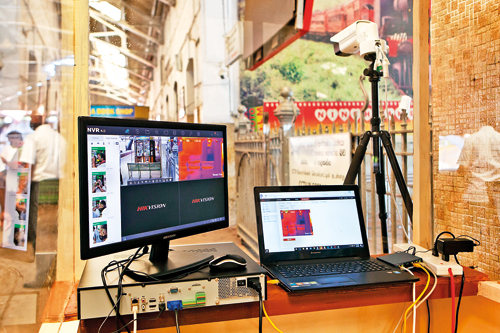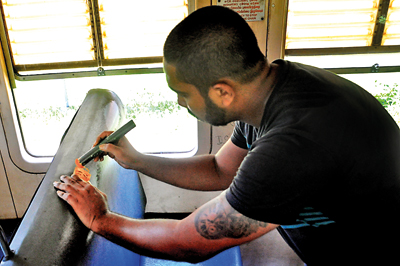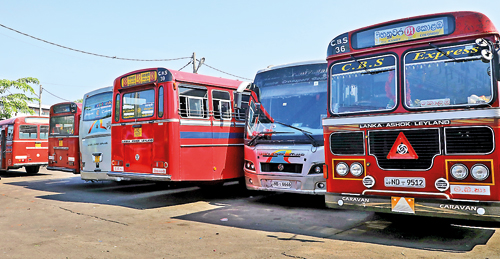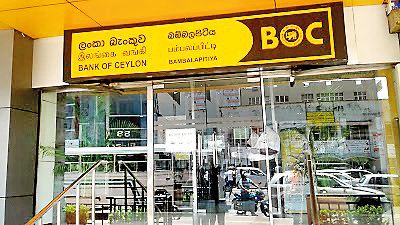News
The dos and don’ts as civilian life to resume amidst COVID-19

This monitor installed at the entrance of the Fort Railway Station on Saturday will show detalis pertaining to each passenger-- seat number, destination etc. Pic by Sameera Weerasekera
As the country gears up for the resumption of civilian life from tomorrow, questions remain regarding how a host of measures aimed at restoring normalcy in the country will fare, with COVID-19 still an ever-present threat.
As this article was being written on Saturday, Health Minister Pavithra Wanniarachchi was due to issue an extraordinary gazette notification laying out new regulations and guidelines that various entities and members of the public are expected to follow once civilian life resumes.
Government officials this week cautioned that it will be unrealistic to expect everything to work like clockwork from May 11 itself. Depending on the success of the new measures however, they are optimistic that it will be possible to lift more restrictions as the weeks go by.
Nevertheless, they stress that the public will have to adapt to the “new normal” when going about their daily lives in a post-COVID-19 situation. “We can’t go back to the life that existed before COVID-19, at least not yet,” an official from the President’s Office told the Sunday Times, pointing out that civilian life and work will resume next week while a curfew is still in effect in the Western Province and the Puttalam district.
While most parts of the country have slowly started to open up under health and social distancing guidelines with periodic relaxations of curfew over the past two weeks, the Western Province and the Puttalam district, identified as high risk areas for the spread of the disease, have remained under an indefinite curfew for almost six weeks. Given that the Western Province, particularly Colombo district, is the economic hub that drives the country, the Government has been making plans to gradually open it up since late April. Accordingly, the goal is to open up the Western Province for civilian life as well as for state and private sector activities while curfew is still in effect.
The President’s Office had earlier made plans to resume civilian life from May 4, but these were pushed back to May 11, with the Government stating the decision was taken on account of there being four holidays this week due to Vesak. In its media release issued on April 25, the Presidential Secretariat instructed heads of State organisations including Departments, Corporations and Boards that they should call in only ⅓ of their workforce, with the others working from home. This was revised in the release issued on May 1. Accordingly, the heads of each State organisation were given the responsibility to decide who should come into office and determine their number.
“While instructions that only a minimum number of workers needed to run the organisation should be called in still stands, a decision was made to revise the earlier directive stating only ⅓ of the workforce should come to work as some State organisations told us it would be difficult to conduct day-to-day activities with such a small workforce,” the official from the President’s Office explained. For example, he revealed that the State Pharmaceuticals Corporation had notified that it would need more of its workforce to be present given that it required personnel to sort out medicines needed by a large number of people.
Heads of private institutions can also choose the number of people needed to come to work each day. While carrying out operations in their workplaces, they, as well as heads of the State sector organisations must ensure strict adherence to guidelines issued by the Director General of Health Services and other health authorities to minimise the spread of COVID-19.
Private sector institutions have been requested to open for work at 10 a.m. daily.
Health Services Director General Dr Anil Jasinghe has instructed heads of all institutions to refer to the “Operational Guidelines on Preparedness and Response for COVID-19 Outbreak for Work Settings,” an interim set of guidance issued by the Health Ministry. The document sets out guidelines to modify work practices and work environments to prevent any possible transmission of COVID-19 in workplaces. The guidelines can be downloaded from the websites of the Health Ministry and Prime Minister’s Office.
Many employees who work in offices in Colombo reside outside the Colombo district. While travel between high risk districts continues to be prohibited, Police Spokesman, Superintendent of Police (SP) Jaliya Senaratne said it will not apply to those travelling to Colombo for work, though they would need to present proof that they have been called into work.
“Even during curfew, we have allowed those from essential services to travel between districts using their Service ID as a curfew pass. This practice will continue. Employees of supermarkets, shops and delivery services who already have curfew passes issued to them can continue using them. Others going to offices for work will need to present some proof, such as by way of a letter from their company stating that they have been asked to report to work. We know that many may not have such a letter by May 11. We will brief them when entering Colombo about this and tell them to get a letter from their employer as soon as possible,” he explained.

Dematagoda: A train carriage and engine control room being disinfected. Pix by Priyantha Wickramaarachchi
Those who are undergoing a mandatory period of self-quarantine are not permitted to travel to work, and should inform their employer of this fact if they are asked to report to work. Likewise, any person currently in an area under lockdown also cannot leave for work until the lockdown is lifted.
Members of the public who don’t have to report to work must remain in their homes and should only go out to purchase essential items such as food and medicines. Even so, in Colombo, Gampaha, Kalutara and Puttalam districts where curfew is in effect, such persons can only go out to purchase essential items through the pass system based on the last digit of their National Identity Card (NIC).
Accordingly, those with the numbers 1 or 2 as the last digit of their NIC are allowed to leave home to purchase essentials on Monday. People with number 3 or 4 as the last digit of their NIC can leave home on Tuesday while those with the number 5 or 6 can go on Wednesday. Persons who have either 7 or 8 as the last digit of their NIC can leave on Thursday while Friday has been set aside for those having either 9 or 0 as the last digit of their NIC.
SP Senaratne clarified that this NIC pass system will only apply to areas where curfew is still in effect. Unless more areas are placed under curfew by Monday, the system will only be in effect in the three districts of the Western Province and the Puttalam district.
“Even for those leaving home on the day allocated for them based on the last digit of the NIC, our advice to them is to visit the shop that is closest to their house and is within walking distance, and to return immediately after purchasing the items they need,” SP Senaratne said, stressing the pass system should not be abused by people to travel around unnecessarily, given that the spread of COVID-19 remains a serious danger in these districts.
Those in districts where curfew is lifted need not worry about the NIC system when going out for essentials, he stressed.
Police and security forces personnel will continue to man roadblocks and check vehicles and people coming into Colombo. As such, SP Senaratne urged the public travelling to the city by vehicle to leave home early on May 11 as some delays and traffic congestion is expected at entry points into the district. “Given that only a limited number of people will be travelling to work, we expect there will be less number of vehicles than on a normal working day before COVID-19. Nevertheless, we will need to brief those travelling to the district regarding what is required of them as many will likely still be unaware about some details. This will take time, which is why our advice is for people to leave early.”
Naturally, things will not be perfect from May 11 itself, the police spokesman noted. “It will take a week or two for the system to settle. Authorities will then be able to reassess the situation and decide whether to further relax restrictions,” he pointed out.

Sticking on seat numbers
Transport
Efficiency in the public transport system will be crucial to the success of the Government’s measures to resume civilian life and office work from tomorrow.
Earlier in the week passenger Transport Management Minister Mahinda Amaraweera told the Sunday Times he had full confidence that both Sri Lanka Railways (SLR) and the Sri Lanka Transport Board (SLTB) were capable of meeting passenger needs from next week.
“Both the SLR and SLTB have put in place mechanisms to enable them to meet the requirements of those travelling to work. There are still some details to be worked out with health authorities. We hope all that will be settled by Sunday,” he added.
Health and social distancing guidelines will be strictly enforced at train and bus stations as well as inside trains and buses, with masks being mandatory for both passengers and staff. Passengers will also need to maintain a minimum of 1 metre distance from each other at all times and the number of passengers will be limited to 50% of the seating capacity of a bus or train compartment.
Under the first stage of the new rail transportation system, only employees from the Government or Private sector who hold railway season tickets (Monthly/Quarterly) will be allowed to travel by train, General Manager of Railways Dilantha Fernando said.
Heads of institutions must send the list of their employees who will be travelling by train via fax or email so that the Railway Department can enter their names into a central database. The details required are the name of the employee, NIC number, contact number, residential address, dates on which they will travel to work, entrain/detrain stations, service type, season folder number and the time they are expected.
Details of employees can be emailed to railwaycomoffice@gmail.com or faxed to 0112432128, 0112431909 or 0112446490.
“Once we get this information, we calculate passenger demand line-wise and station-wise. We then arrange a train schedule and make a time table accordingly, Mr Fernando explained.
The train schedule is sent to institutions that have forwarded details of their employees who are travelling to work. An authorised officer from each institution can then access the train reservation web application using a customised username and password. The officer can then reserve seats for the respective employees of the institution based on provided information.
Once the reservation is confirmed, an SMS is sent to the passenger confirming their reservation. The message contains the train number, time, compartment and seat number. This SMS will serve as the gate pass to access the railway station. No passenger unable to produce the SMS sent to them will be allowed into the station.
Once through the gate, the passenger has to also confirm their presence via SMS, which will be entered into the database. There will be a pre-reserved seat for all entrained passengers. They can either find the seat themselves or ask for assistance from railway staff. Passengers are not allowed to change their seats on the train under any circumstances.
Passengers are advised to come to stations early as if they miss their scheduled train, they will not be allowed to travel on any other train. Passengers are also advised to refrain from carrying extra bags/baggage, while activities such as group chats, playing cards and gatherings inside trains are strictly prohibited. Railway security staff, police and security forces personnel will be present at railway stations and will travel in trains to enforce health and social distancing guidelines.
The SLTB is adapting a similar strategy for long distance buses. An official at the Passenger Transport Management Ministry said employees travelling to Colombo to work from outstations should get in touch with the SLTB depots in their area and confirm the dates on which they will be travelling to work. The number of buses to be deployed is decided by the number of persons who will be travelling to work from that area on that date. “For example, about 25 persons have got in touch with the Elpitiya SLTB depot and confirmed they will be travelling to Colombo to report to work from May 11. Accordingly, one SLTB bus is now scheduled to travel from Elpitiya to Colombo. That bus will stay on in Colombo till those individuals are picked up after work.”
The official said the Transport Ministry had written to the Director General of Health Services requesting that both SLTB and private buses be allowed to transport passengers as per the number of seats in the buses. “Private bus owners have informed us they are not prepared to continue operating buses if the health authorities insist on the 50% passenger limit since they will be running at a loss. We are yet to hear back from health authorities. If they insist on the 50% passenger limit, it will likely mean that only SLTB buses will be operational in most districts. But we still feel we can shoulder the burden since only a limited number of persons will be travelling to work,” the official added.
 Private Buses
Private Buses
The Lanka Private Bus Owners’ Association (LPBOA) says it is unlikely that many private buses will be available to commuters to travel to Colombo on May 11.
LPBOA President Gemunu Wijeratne said a typical 50 seater bus will only be able to carry 25 passengers if the authorities insist that the number of passengers should be 50% of the seating capacity. “We understand that this is necessary to minimise spread of the disease, but we won’t be able to keep running buses this way as the losses are too high,” he argued.
Mr Wijeratne said bus owners had asked the Government for a diesel subsidy amounting to Rs 50 per litre to keep buses running until the end of May. “We understand that the Transport Minister presented a Cabinet paper in this regard, but it was rejected by Cabinet. We only asked for the subsidy till the end of the month. If they are not prepared to give even that, I don’t see how we can do much.”
He added that some buses will still run, but warned many are unlikely to stick to the guidelines laid down by authorities. “We have seen this before in districts where curfew is lifted. They keep to the 50% seating capacity when leaving the main bus stand but as soon as they are away, they overload passengers. The main concern is long distance buses travelling between districts. We won’t be able to stop them overloading the buses. I don’t know if the authorities have enough personnel to check all buses,” he said.
Mr Wijeratne also accused authorities of not taking steps to put in place a system to warn bus drivers about areas that are locked down. “Say some part of Colombo is suddenly placed in lockdown, where is the system to warn drivers to avoid the area? What happens if at least one person from such an area evades authorities and gets on a bus? Where is the safety net to prevent that happening?” he queried.
 Banks
Banks
Both state and private banks said they were still uncertain regarding plans to open for business from May 11 in areas where curfew will still be in effect.
While banks are already operating their branches under normal banking hours in areas where curfew has been lifted, only select branches have been opened in areas where curfew is in effect, and banking hours in these branches have so far been limited to two and a half to two hours (either 8.30 a.m. to 11 a.m. or 9 a.m. to 11a.m.). As of Friday (8), many banks the Sunday Times contacted were still uncertain as to how their operations in curfew-affected districts will change from next week.
The reason for the uncertainty is that banks were unsure if the situation will again change during the weekend and if the Government will put out an updated release on how the resumption of civilian life and office work will begin. As such, customers are advised to check their bank’s website or its official social media accounts such as Facebook pages for the latest updates. Alternatively, they can also call dedicated customer hotlines of their respective banks for more details.
 Supermarkets
Supermarkets
Supermarkets are also making plans to open from Monday with health and social distancing guidelines in place. Opening times though, may vary between different supermarket chains.
The Health Ministry has issued a set of guidelines for supermarkets to follow when they reopen. These include providing handwashing facilities for customers to wash their hands before entering the premises, take only a designated number of persons into the store in order to maintain 1 meter distance between two persons including at the queue, making masks mandatory for all customers and staff, maintaining express counters (less than five items), removing all customer operated devices such as touch screens at the cashier and suspending all utility bill payments.
Keells Super announced on Friday that all its branches will remain open from 8 a.m. to 8 p.m. daily until further notice.
The supermarket chain will enforce the guidelines issued by the Health Ministry, with only 15 customers being allowed into the store at any given time. Keells has also announced that maximum quantity restrictions will apply to various product categories. The supermarket chain stated that its bakeries will not be self-serviced and customers must seek assistance from a staff member to obtain bakery products. Customers have also been asked not to weigh produce/loose items and to obtain staff assistance for this purpose. Keells will also introduce a special queue for elders (aged above 65 years).
Cargills Food City will open its branches from Monday adhering to health and social distancing guidelines issued by the Health Ministry. In areas where curfew is in effect, customers can visit Cargills Food City branches during the week based on the last digit of their NICs. Branch opening times in districts under curfew as well as in districts where curfew has been lifted, will be communicated via social media.
Other supermarket chains too will be opening their branches from Monday onwards while following guidelines issued by the Health Ministry. Customers are advised to check the social media accounts of the supermarket chains regarding opening and closing times.


